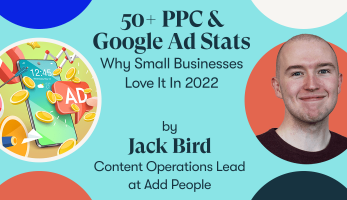Want help implementing the PPC best practices?
What is PPC marketing?
PPC marketing, or pay-per-click marketing, is a digital advertising strategy in which advertisers pay a fee each time their ad is clicked.
It is a method of buying visits to your website rather than earning them organically.
PPC ads are typically displayed on search engine results pages (SERPs), social media platforms, or websites, and they are designed to target specific keywords or audience demographics.
By bidding on keywords or setting a predetermined budget, advertisers can place their ads in prominent positions, ensuring greater visibility and the potential to attract relevant traffic to their websites.
PPC marketing offers businesses the opportunity to reach their target audience directly, increase brand visibility, and generate leads or sales, all while having control over their ad spend.
Where are PPC ads shown?
PPC ads can be displayed across various online platforms and websites, offering businesses a wide reach and the ability to connect with their target audience at different touchpoints.
One common placement for PPC ads is search engine results pages (SERPs), where they appear alongside organic search results when users enter relevant keywords.
Additionally, PPC ads can be shown on popular social media platforms like Facebook, Instagram, Twitter, and LinkedIn, either as sponsored posts or in the sidebar.
Display networks, such as Google Display Network, enable businesses to showcase their ads on a network of websites, reaching potential customers as they browse various webpages.
Moreover, PPC ads can be found in mobile apps, video streaming platforms, and even in email newsletters, allowing businesses to engage with users across multiple channels and devices.
With such diverse placement options, PPC ads provide businesses with extensive opportunities to connect with their target audience throughout their online journey.
6 Best practices for PPC marketing management
Clearly define goals and plan accordingly.
In the dynamic world of PPC advertising, one of the most crucial things for small businesses to do is to clearly define their goals and then plan the campaign with this at the forefront of everything.
Without a solid understanding of what you want to achieve, your PPC campaigns can quickly become directionless, leading to wasted resources and missed opportunities.
By setting specific and measurable goals, such as increasing website traffic, generating leads, or driving sales, you lay the foundation for a focused and effective strategy.
Setting goals doesn’t just assist with the planning,
it also enables you to track and measure the success of your PPC campaigns.
By monitoring key metrics such as click-through rates, conversion rates, and return on ad spend (ROAS), you can assess the effectiveness of your strategies and make data-driven optimizations.
This iterative process of analysis and adjustment allows you to refine your campaigns over time, maximizing their impact and improving the overall return on investment (ROI).
So, take the time to define your goals, craft a well-thought-out plan, and embark on your PPC journey with confidence. The rewards are waiting to be claimed.
Conduct thorough keyword research
Conducting thorough keyword research emerges as an indispensable best practice for small businesses venturing into the realm of PPC advertising.
Keywords form the foundation of your PPC campaigns, acting as the bridge between your business and your target audience.
By understanding the words and phrases potential customers use when searching for products or services like yours, you gain invaluable insights into their intent and can tailor your ad messaging accordingly.
Additionally, thorough keyword research empowers small businesses to optimize their PPC budget effectively.
By identifying cost-effective keywords with a strong potential for conversion, you can allocate your budget strategically and focus your resources on the most valuable opportunities.
Invest the time and effort into comprehensive keyword research, and watch as your PPC campaigns gain traction, engagement, and ultimately, the results you desire.
Don’t know where to start? There are online tools such as Semrush and Ahrefs to help you with your research.
Agree a budget and stick to it
In the dynamic and potentially costly world of PPC advertising, agreeing on a budget and, more importantly, sticking to it, emerges as a vital best practice for small businesses.
With limited resources at hand, it’s essential to establish a realistic and well-defined budget that aligns with your overall marketing goals.
By setting clear financial boundaries from the start, you can maintain control over your spending and avoid unforeseen financial strains.
Agreeing on a budget ensures that you allocate your resources strategically across your PPC campaigns.
It allows you to make informed decisions on how much you’re willing to invest in keyword bidding, ad placements, and other campaign elements.
By defining your budget, you can also prioritize the most critical areas of your PPC strategy, ensuring that your limited funds are channelled into the most impactful activities.
Sticking to your budget is equally important.
It prevents overspending and helps you maintain financial discipline, which is particularly crucial for small businesses with tight budgets.
It’s easy to get carried away with the allure of PPC advertising, especially when initial results show promise.
However, by adhering to your predetermined budget, you ensure a sustainable approach that keeps your financial stability intact.
Set a budget that aligns with your resources, commit to it, and let it be your guiding principle as you navigate the world of PPC advertising.
Write compelling ad copy
Writing compelling ad copy stands as an indispensable best practice for small businesses.
With limited space and mere seconds to capture a user’s attention, your ad copy becomes the voice of your brand, the gateway to engaging potential customers, and the key to driving conversions.
By crafting compelling and persuasive ad copy, you have the power to entice, inform, and compel users to take action.
Compelling ad copy starts with a deep understanding of your target audience.
By knowing their needs, pain points, and desires, you can tailor your messaging to resonate with them on a personal level.
A well-crafted ad copy speaks directly to your audience, addressing their specific challenges and offering a clear solution.
It highlights the unique value your product or service provides and emphasizes the benefits they stand to gain by choosing your brand.
Strong ad copy is concise, clear, and action-oriented. It makes every word count, delivering a powerful message in a succinct manner.
By including compelling calls-to-action (CTAs), you guide users towards the desired action, whether it’s making a purchase, signing up for a newsletter, or requesting more information.
With persuasive ad copy, you can unlock the full potential of your PPC campaigns and propel your small business towards greater success.
Track the right metrics for your goals
Simply launching PPC campaigns is not enough; you must have a clear understanding of which metrics are most relevant to your specific objectives.
By tracking the right metrics, you gain valuable insights into the performance and effectiveness of your campaigns, allowing you to make data-driven decisions and optimize your strategies for maximum impact.
Identifying the right metrics starts with aligning them with your goals.
If your primary objective is driving website traffic, tracking metrics such as click-through rates (CTRs) and impressions can provide insights into the visibility and attractiveness of your ads.
On the other hand, if your focus is on generating conversions, metrics like conversion rates, cost per acquisition (CPA), and return on ad spend (ROAS) become crucial indicators of success.
Furthermore, tracking the right metrics enables you to identify areas for improvement and optimize your campaigns over time.
By continuously monitoring and analysing key metrics, you can uncover patterns, trends, and opportunities.
This iterative process allows you to make informed adjustments to your ad copy, targeting, landing pages, or bidding strategies, driving incremental improvements in campaign performance.
So, identify the metrics that align with your goals, leverage analytics tools to track them accurately, and use the insights gained to refine your PPC campaigns and drive sustainable success.
Consistently test and optimise your campaign for maximum results
By embracing a culture of ongoing testing and optimization, small businesses can stay ahead of the curve and ensure that their PPC campaigns remain relevant, effective, and efficient.
Testing different elements of your PPC campaigns, such as ad copy, landing pages, targeting criteria, and bidding strategies, allows you to uncover insights and identify what works best for your target audience.
A/B testing, for instance, enables you to compare two versions of an element, measuring their performance and making informed decisions based on the results.
By continuously testing and experimenting, you can refine your campaigns, unlock hidden opportunities, and drive better results.
Optimization is the natural outcome of testing.
By analysing the data and insights gathered from testing, you can make data-driven optimizations to improve the performance of your PPC campaigns.
This could involve adjusting keywords, refining ad messaging, fine-tuning targeting parameters, or optimizing landing pages for better conversions.
Optimization allows you to maximize the impact of your campaigns, ensuring that you extract the most value from your ad spend.
Make testing and optimization an integral part of your PPC strategy and watch as your campaigns reach new heights of performance and success.
With the dynamic nature of PPC advertising, small businesses must navigate their way strategically to achieve success.
By implementing these best practices, small businesses can unlock the full potential of their PPC advertising efforts, reach their target audience effectively, and drive tangible results.
With a clear strategy, relevant keywords, disciplined budgeting, persuasive ad copy, informed tracking, and ongoing optimization, small businesses can elevate their PPC campaigns and achieve sustainable success in the competitive digital space.
Ready to take your PPC campaigns to the next level?
Contact us today and unlock the full potential of your advertising efforts. Our experienced team specializes in PPC management for small businesses, implementing proven strategies and best practices to drive tangible results.
Reach out to us now and let’s start boosting your PPC success together!




